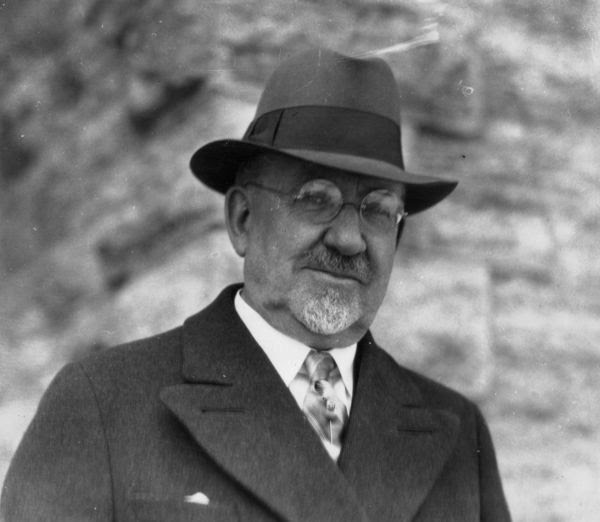Description
GOD’S PROPHECIES FOR PLAIN PEOPLE
by
William L. Pettingill
1923
2015
The Truth About CHRIST’s Second Coming. 4
Chapter Two – The “Rapture” and the First Resurrection. 10
Chapter Three – The Marriage Supper and the Wedding. 17
Chapter Four – What Occurs at CHRIST’s Judgment Seat 25
Chapter Five – The Amazing Final Seven Years. 32
Chapter Six – The Beast King and the False Prophet 39
Chapter Seven – The Jews’ Sensational Age-Ending. 50
Chapter Eight – Why Only One Great Tribulation?. 58
Chapter Nine – Armageddon – When It Comes. 65
Chapter Ten – CHRIST’s Earth-Convulsing Return. 75
Chapter Eleven – How Will CHRIST Judge the Nations?. 85
Chapter Twelve – When the Jews Become Mankind’s Glory. 92
Chapter Thirteen – If You Were Living in the Golden Age. 101
Chapter Fourteen – SATAN’S LIFE-STORY: PAST, PRESENT, FUTURE 112
Chapter Fifteen – The Judgment at the Great White Throne. 122
Chapter Sixteen – After the Millennium – What?. 131
This book consists of articles written for THE SUNDAY SCHOOL TIMES and appearing in that periodical during 1919.
The editor of THE TIMES, at the beginning of the series, invited readers to ask questions on the topics treated, and these questions were answered by the author. The questions and answers will be found in the Prophetic Question at the end of the book.
The Truth About CHRIST’s Second Coming
“Make it plain.” Thus the LORD spake to His servant Habakkuk twenty-five hundred years ago, and He was speaking about the Second Coming of CHRIST, though His First Coming was yet six hundred years in the future when the words were spoken.
The record is in Habakkuk’s second chapter. “I will stand upon my watch, and set me upon the tower“, says the prophet, “and will watch to see what he will say unto me, and what I shall answer when I am reproved” (Habakkuk 2:1). And the LORD answered me, and said, Write the vision, and make it plain upon tables, that he may run that readeth it. For the vision is yet for an appointed time, but at the end it shall speak, and not lie: though it tarry, wait for it; because it will surely come, it will not tarry” (Habakkuk 2:2, 3).
That this Scripture has to do with the Second Coming of CHRIST is proved by the use made of it by the HOLY SPIRIT in the New Testament. In the Epistle to the Hebrews, chapter 10, it is quoted, with a change – which, of course, the divine Author of both Habakkuk and Hebrews has a perfect right to make; and there we read: “For ye have need of patience, that, after ye have done the will of God, ye might receive the promise. For yet a little while, and he that shall come will come, and will not tarry” (36, 37).
“Write the vision, and make it plain upon tables, that he may run that readeth it.” Not, “that he that runneth may read it,” but that the one who has read it may run with it to others – “that he may run that readeth it.” Two and a half millenniums were to elapse before its fulfillment, but nevertheless “the vision is yet for an appointed time,” and just as Messiah’s first advent was precisely according to schedule – “in due time Christ died for the ungodly“; so shall it be with His Second Advent. The vision hastens and “at the end it shall speak, and not lie: though it tarry, wait for it; because it will surely come, it will not tarry.” Our GOD needs not to hurry, and with Him a thousand years is but one day. Nineteen centuries seem long to us, but with Him they are less than two days. It is well, therefore, to be patient. “For yet a little while, and he that shall come will come, and will not tarry.”
Starting Off on the Right Foot
“Make it plain,” said the LORD. And “make it plain,” said the Editor of the Sunday School Times. Having in mind the ever incoming number of new readers, the Editor is concerned that these shall be taught in clear and simple language the plain truth about CHRIST’s Second Coming.
Let us get it settled, to start with, that the Bible is true, and that we may receive what it says with unquestioning faith. Unless this point is settled, we cannot go on. To those who are truly born again, no difficulty is presented here. It was the Good Shepherd Himself who said, “My sheep hear my voice,” and it is true that the Christian recognizes in Scripture the voice of CHRIST, Whose Word is the last word, and Whose testimony settles everything.
Starting, then, with the premise that the Bible always speaks truly and with authority, we go on to inquire as to just what it says about the Second Coming of CHRIST. Turning from all human authority, – for in the last analysis there is no such thing as human authority in the realm of spiritual things, – we come to the fountain of truth. What does the Bible say?
In two ways we shall attempt to bring forth an intelligent and intelligible answer to our question, What does the Bible say?
First, in addition to this introductory article, there will be fifteen articles in the series.
Then, in addition to this, a Question Box on Prophecy will be conducted in connection with the series of articles, in which an honest attempt will be made to answer questions from readers as we go along. Controversy and prolonged discussion will be avoided, and answers to such questions as are to come up later on will be deferred until we reach their place in the schedule. Let us think of the series as a class in the Bible School room, and, so far as conditions may permit, let us conduct ourselves accordingly.
Among the LORD’s people there are, broadly speaking, two widely divergent views of the age in which we live. By far the larger number, it would seem, hold what may be termed the “evolution theory” of the course of the age. The minority, on the other hand, cleave to a “revolution theory.” The former insist that everything is growing better and better all the time, tending toward a Millennium of universal blessing, winding up in the return of CHRIST at the end of the thousand years. Those who hold this view are convinced that it is the mission of the Church to make the world better by improving social conditions, thus bringing in the Millennium of worldblessing and preparing the world to receive and welcome CHRIST at “the end of all things.”
Opposed to this view are those who believe that instead of the world’s growing better it is growing worse. They look upon the present world-system as a sinking ship, with, however, the lifeboat alongside, and they are urging men to separate themselves from the doomed vessel and to take refuge in CHRIST the lifeboat. They look for no Millennium until CHRIST comes back to bring it in. Instead of bringing in the Millennium by means of social improvement and civic betterment, they insist that it must be brought in by GOD’s heavy hand in judgment. These are the premillennialists, so called because they expect the Second Coming of CHRIST before the Millennium. The others are called postmillennialists, because they expect the Second Coming of CHRIST after the Millennium has run its course.
Sailing in the “Safety Zone”
Who shall decide which of these schools is right? We answer, the Bible must decide. What saith the Scriptures? This shall be the question constantly before us throughout our course of studies.
What does the Bible say? What it says, we must believe. What it denies, we must reject. “To the law and to the testimony: if they speak not according to this word, it is because there is no light in them” (Isaiah 8:20).
Many say it is all a matter of interpretation. Well, in this classroom of ours we shall avoid matters of interpretation. We shall confine ourselves to the Bible’s plain statements, statements which will need no interpretation. This will keep us all the time in the “safety zone,” and we shall not lose our way in the maze of speculation.
To come now to the real work in hand, let us begin with a brief look at the Old Testament Scriptures, to learn whether they require a Second Coming of CHRIST.
In I Peter 1:11 a brief summary is given of Old Testament prophecy. The Apostle declares that the Old Testament Prophets searched diligently, to learn “what, or what manner of time the Spirit of Christ which was in them did signify, when it testified beforehand the sufferings of Christ, and the glory that should follow.”
The sufferings and the glory – these were the two themes of the Prophets. These two lines of prophecy confused the Prophets themselves, through whom the HOLY SPIRIT gave the testimony; and, as Peter goes on to explain, it was revealed to them that not unto themselves did they minister these things, but unto those who should live long after their time.
There is, for example, the Twenty-second Psalm, which has been called “the Psalm of Sobs,” depicting so vividly the sufferings of CHRIST on the Cross. But there is also the Twenty-fourth Psalm, setting forth His glory.
His sufferings fill the fifty-third of Isaiah, but His glory, as the King enthroned, fills the eleventh and many other chapters in that Prophet’s writings.
Every student of the Scriptures is familiar with these two sharply contrasting streams of prophetic testimony, which so puzzled the rabbinical commentators in the time before CHRIST’s First Advent that some of them declared there must be two Messiahs coming, – one to fulfill the prophesied sufferings and the other to be glorified in the Earth. Sometimes these two lines of testimony converged in one passage, as, for example, Isaiah 9:6, 7, where a colon divides between the sufferings and the glory; the Child has been born, and the Son has been given – even unto death; but the government is not yet upon His shoulder, and He does not yet occupy His father David’s throne. In the time yet future “The zeal of the LORD of hosts will perform this.” Another example is found in Isaiah 61:1,2, which was the passage read by the LORD JESUS when He preached in His little home-town of Nazareth, and in which He stopped reading at a comma in the second verse in order that He might say, “This day is this Scripture fulfilled in your ears” (Luke 4:21). He could not have said that if He had read another clause of the sentence He had begun.
Well, in due time CHRIST came, and, beginning with His birth at Bethlehem, fulfilling Micah 5:2, He went straight through the prophecies concerning His sufferings, until even the last jot and tittle of them were accomplished, and then He died and rose again, still fulfilling the Scriptures. But, while all the predictions concerning His sufferings were fulfilled, not so much as a single syllable was fulfilled of that far greater mass of predictions pointing to His glory. The Old Testament demands a Second Coming of CHRIST for the fulfillment of these unfulfilled predictions.
Added to the Old Testament Scriptures, demanding His return for their fulfillment, there is the oft-repeated promise of the LORD JESUS CHRIST that He would return “in the clouds of Heaven with power and great glory.” There is no mistaking the words, “I will come again,” and practically all His teachings on the subject of His return is just as simple as that.
The Way CHRIST Made it Plain
Let our class study, carefully and prayerfully, without commentary or other “helps,” the Olivet Discourse of our LORD, recorded in Matthew 24 and 25 and Luke 21. We shall be looking at it somewhat in detail later on in the course; but please notice how very simple the language is, descriptive though it is of most wonderful and glorious “things which must shortly come to pass.”
And, for our present purpose, let it be observed that the Second Coming of CHRIST is not to be in a time of Millennial blessedness and peace, but at a time of darkness and evil. It will be like the days of Noah (Matthew 24:37), when things were so bad that GOD swept the race from the Earth; or like the days of Lot (Luke 17:28, 29), when the corruption of Sodom and Gomorrah smelled to Heaven and brought down the destructive hail of fire and brimstone to wipe them out of existence: “So shall also the coming of the Son of man be.”
Thus saith the Scriptures.
It needs no “interpretation,” for it is so plain that interpretation is a work of supererogation. It speaks clearly, and we have only to believe what is says.
To believe it is to believe GOD.
To disbelieve it is to make GOD a liar.
May the HOLY SPIRIT of truth, always ready to guide the children of GOD into all truth, give us hearts to follow as He leads our class throughout these studies; and may the result be that we shall be led into the fulness of the blessing of the Gospel of CHRIST, so having this hope in Him that we shall indeed purify ourselves, even as He is pure!





Reviews
There are no reviews yet.